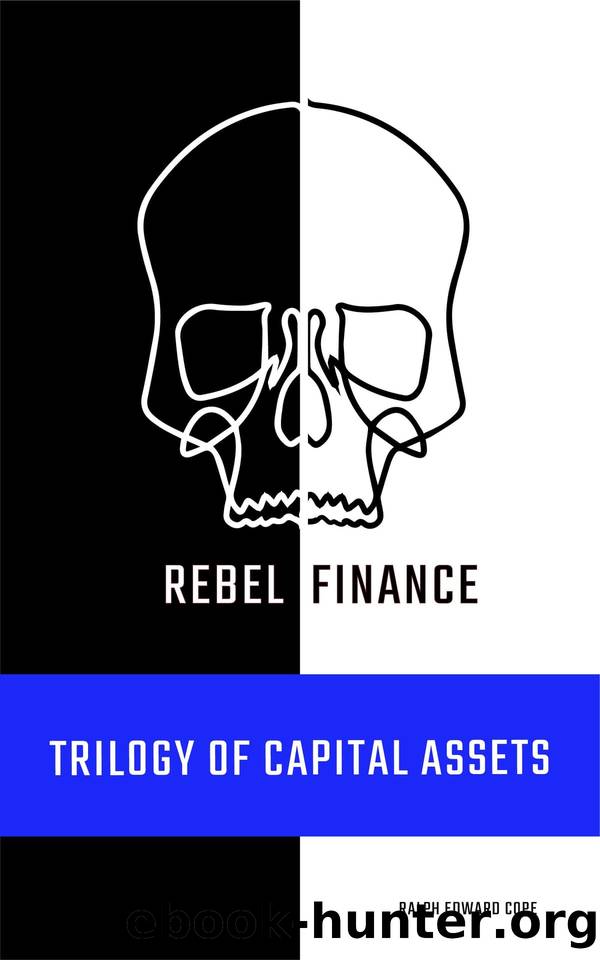Rebel Finance - Trilogy of Capital Assets by Ralph Edward Cope

Author:Ralph Edward Cope [Cope, Ralph Edward]
Language: eng
Format: mobi
Published: 2020-04-13T00:00:00+00:00
CHAPTER 10: SHADOW BANKING
We learn from history that we do not learn from history.
Hegelâs paradox
The 2008 financial crisis was not caused by the lack of regulation in the banking sector but by the lack of regulation in the shadow banking sector. So what is shadow banking?
The term shadow bank was coined by the charismatic economist (how about that for an oxymoron) Paul McCulley and the annual financial symposium hosted by the Kansas City Federal Reserve Bank in Jackson Hole , Wyoming. As the name suggests, it is banking that takes place in the shadows - in the dark damp alleys far from the pure and precious light that can only be afforded by the angelic countenance of financial regulators.
The shadow is dark and evil while the light is pure and good. That which happens in the shadow must be brought to the light. The objective of this chapter is to shine the light on shadow banking and see it in all its glory.
Shadow banks first caught the attention of experts like McCulley for their ability to turn home mortgages into marketable securities. The securitization chain started with the origination of mortgages that were then bought from the banks, packaged into securities and sold to investors.
This meant that a mortgagor in Denver could end up owing money not to his local bank in Denver, but to a teachers pension fund in Toronto. Almost the entire securitization chain was out of the sight of the regulators. Most people don't pay much attention to shadow banking because they believe it does not affect them personally. Here is the funny story which shows just how shadow banking does affect you and the total ineptness of regulators.
Regulators and politicians, like the majority of human beings, are financially illiterate. They do not understand the mechanics of money and the operation of financial markets. When Lehman Brothers collapsed and we entered the biggest financial crisis in the modern times, these same illiterate people were called upon to write new rules to ensure that a similar crisis did not happen again.
They bailed out banks with taxpayer's money and the taxpayers were pissed off. For the first time, we heard the term "moral hazard" and the concept of "privatization of profits" and the "nationalization of losses". Politicians had sent a message that certain banks were systematically too big to fail and they would be helped, supported and nurtured regardless of how big they were.
Why did they help all the banks except for Lehman's? Rumors were that it was personal. The then CEO of Lehmans was Dick Fuld. He is as well-liked in the financial community as Woody Allen at the Muslim Film Festival. Rumor on the street is that they let Dick hang.
The financial crisis had forced politicians into a compromising position â a situation they do not like to be in unless it involves naked women and hundred dollar bills. They wanted to avoid another embarrassment so they wrote legislation to make big banks bulletproof. The goal was to make it impossible for big banks to fail regardless of how stupid and arrogant their CEOs were.
Download
This site does not store any files on its server. We only index and link to content provided by other sites. Please contact the content providers to delete copyright contents if any and email us, we'll remove relevant links or contents immediately.
The Black Swan by Nassim Nicholas Taleb(7109)
Bad Blood by John Carreyrou(6611)
Pioneering Portfolio Management by David F. Swensen(6289)
Millionaire: The Philanderer, Gambler, and Duelist Who Invented Modern Finance by Janet Gleeson(4469)
Skin in the Game by Nassim Nicholas Taleb(4239)
The Money Culture by Michael Lewis(4198)
Bullshit Jobs by David Graeber(4179)
Skin in the Game: Hidden Asymmetries in Daily Life by Nassim Nicholas Taleb(3991)
The Wisdom of Finance by Mihir Desai(3735)
Blockchain Basics by Daniel Drescher(3574)
Liar's Poker by Michael Lewis(3441)
Fooled by Randomness: The Hidden Role of Chance in Life and in the Markets by Nassim Nicholas Taleb(3108)
Hands-On Machine Learning for Algorithmic Trading by Stefan Jansen(3066)
The Intelligent Investor by Benjamin Graham Jason Zweig(3036)
Mastering Bitcoin: Programming the Open Blockchain by Andreas M. Antonopoulos(3035)
The Power of Broke by Daymond John(2975)
Investing For Dummies by Eric Tyson(2948)
You Are What You Risk by Michele Wucker(2779)
Market Wizards by Jack D. Schwager(2697)
